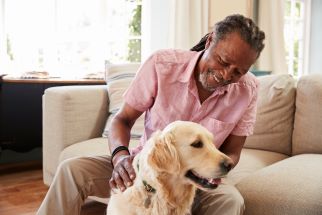January 2024
Pets Can Be Good Companions on Your Cancer Journey
Many people think of their pets as part of the family. That type of close bond with an animal can give you an emotional lift if you’re dealing with a hardship, such as cancer. Below are a few ways that being around a beloved pet can help you feel supported during and after cancer treatment.

Providing comfort
Having cancer doesn’t just affect your physical well-being. It may also bring up a range of strong emotions. At times, you might feel stressed, anxious, sad, down, or overwhelmed. The affection and comfort that you receive from a pet can help you cope with these difficult feelings.
More research is needed on the emotional benefits of pet ownership for people with cancer. But several studies have shown that interacting with a pet or trained therapy animal may help:
-
Reduce stress and anxiety
-
Decrease depression
-
Enhance feelings of well-being
-
Improve overall quality of life
Preventing loneliness
It’s not unusual to feel lonely during cancer treatment. In some cases, you may be unable to go to work or engage in a hobby for a while. This can limit your chances to spend time with friends and coworkers. In other cases, you may have friends and family around but feel as if they can’t really understand what you’re going through.
Pets help fill the void by being great company. They always listen when you want to talk—and they never offer unwanted advice in return.
Beyond that, pets can be a good conversation starter with other people. For instance, you might chat with other dog lovers at the dog park. Or you might make online friends by joining a social media group that’s geared to your kind of pet.
Keeping you moving
Being physically active during and after cancer treatment helps fend off anxiety and depression. It also improves your energy level and physical well-being. Ask your healthcare provider for advice on the types and amounts of activity that are right for you.
A pet gives you added motivation to move. You may be more likely to take a short walk, for example, when you know how excited your dog will be to join you.
Play it safe. At times, your provider may advise turning over some pet care duties to another person. But when you can, walking your dog or playing with a pet may be so much fun that you hardly notice how it’s helping you be active.